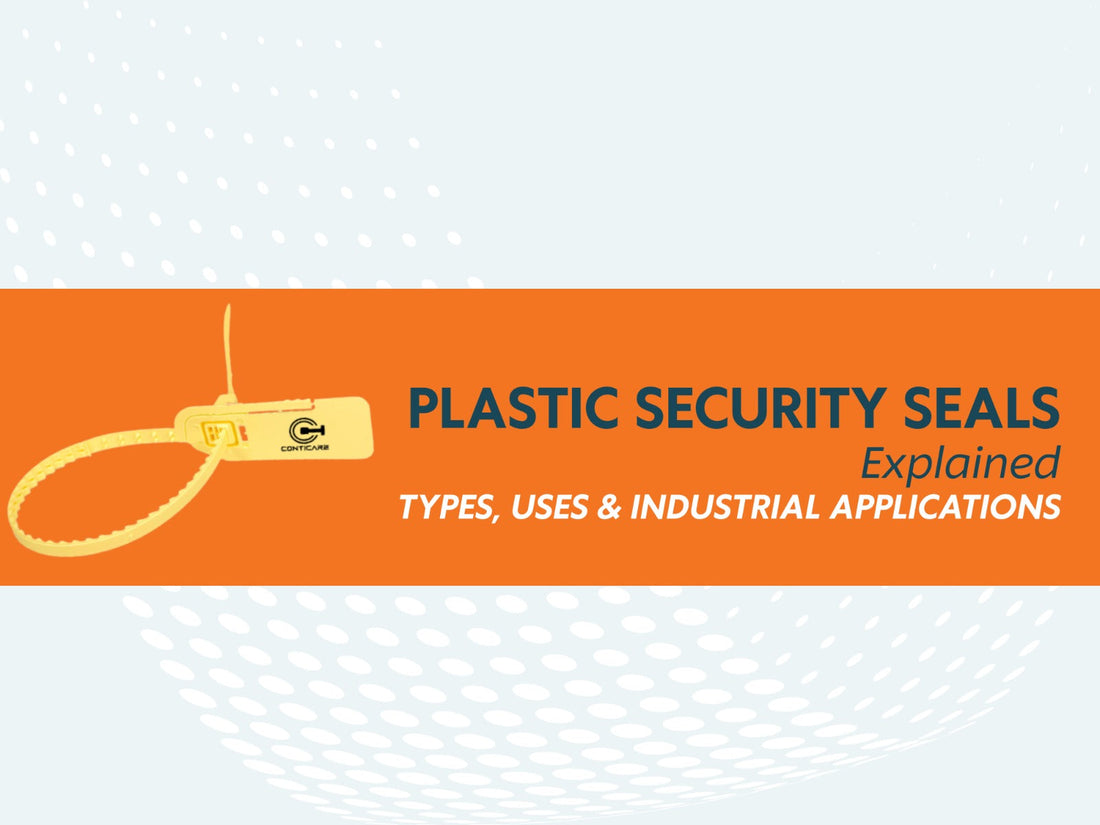
Plastic Security Seals Explained – Types, Uses & Industrial Applications
Plastic security seals might look small, but in industries like logistics, transportation, energy, and retail, they play a huge role in protecting goods and ensuring compliance. As tamper-evident devices, these seals help businesses confirm that packages, containers, and equipment remain secure from the point of dispatch to delivery.
In recent years, the demand for different types of plastic security seals in India has grown rapidly, thanks to stricter regulations, the rise of e-commerce, and increased awareness about cargo safety. From sealing utility meters to protecting high-value shipments, choosing the right seal type can save costs, prevent losses, and maintain trust with customers.
What Are Plastic Security Seals?
Plastic security seals are mostly single-use locking devices made from high-strength plastics such as polypropylene or nylon. They are designed to show visible evidence if tampered with.
They serve two main purposes:
-
Tamper Evidence – If someone attempts to open or break the seal, it becomes obvious.
-
Access Control – Ensures only authorised persons can access the sealed item.
Types:
-
Single-use seals – Cut after use; cost-effective and widely used in many industries. Mostly the plastic seals used in industries are single-use, tamper-evident and high quality.
-
Re-usable seals – Can be unlocked and reused multiple times.
For example: Plastic Shoe tags which are used in garments and retail branding.
Main Types of Plastic Security Seals
Pull-Tight Plastic Seals
Adjustable in length, these seals work much like cable ties, allowing users to tighten them according to the package size.
-
Uses: Courier bags, truck doors, airline trolleys
-
Pros: Flexible, versatile
-
Cons: Can be over-tightened and damage the packaging
Fixed-Length Plastic Seals
Pre-set lengths provide consistent application and are often stronger.
-
Uses: Bulk transportation, fuel tankers, cash-in-transit
-
Pros: High strength, quick application
-
Cons: Less flexible for varying sizes
Padlock-Style Plastic Seals
Small, easy-to-handle seals shaped like padlocks.
-
Uses: ATM cassettes, retail cash bags, lockers
-
Pros: Compact, simple to use
-
Cons: Lower tensile strength
Cable Tie Plastic Seals
Resemble standard cable ties but built from stronger plastics and locking mechanisms.
-
Uses: Electrical panels, machinery, irregular shapes
-
Pros: Highly adaptable
-
Cons: Can be cut easily if low-quality material is used
When & Why to Use Plastic Seals in India?
Plastic seals are essential when transporting valuable or sensitive goods where tampering could lead to financial loss, safety hazards, or brand damage.
They’re used for:
-
Cargo containers
-
Pharmaceutical boxes
-
Fire extinguishers
-
Food-grade storage bins
-
Retail shipments
Industrial Applications of Plastic Security Seals
1. Logistics & Transportation – Sealing truck doors, shipping containers, courier bags, and delivery vehicles.
2. Energy & Utilities – Securing electricity, gas, and water meters to prevent unauthorised access.
3. Retail & Banking – Protecting cash bags, ATM cassettes, and retail inventory.
4. Healthcare & Pharmaceuticals – Ensuring medical supplies, drug kits, and lab samples remain sealed until use.
5. Manufacturing & Warehousing – Tracking goods, preventing theft, and maintaining supply chain integrity.
Common Mistakes to Avoid When Using Plastic Seals
Using the Wrong Seal Type
Choosing a seal that doesn’t match the required strength or application can lead to easy tampering.
Improper Threading or Locking
Incorrect application reduces security effectiveness. Always follow manufacturer instructions.
Reusing Single-Use Seals
This breaks compliance and increases the risk of unauthorized access.
Ignoring Environmental Conditions
High heat, extreme cold, or chemical exposure can weaken certain plastics. Always check specifications.
Plastic vs Metal Seals — Which Should You Choose?
|
Feature |
Plastic Seals |
Metal Seals |
|
Strength |
Moderate tensile capacity |
Very high tensile capacity |
|
Cost |
Low to medium |
Higher |
|
Reusability |
Single-use |
With reusable options |
|
Industry Compliance |
Suitable for most |
Required for certain high-security transport |
|
Best For |
Retail, Courier & Utilities |
High-security freight, heavy cargo |
In many cases, plastic seals are sufficient for everyday logistics, but industries handling hazardous or high-value goods often opt for metal seals.
How to Remove or Cut Plastic Seals Safely (Quick Guide)
-
Use seal cutters or safety knives to avoid injuries.
-
Cut away from the body and other people.
-
Dispose of used seals responsibly to prevent re-use.
Choosing the Right Plastic Seal for Your Industry
When selecting a plastic security seal, consider:
-
Strength & Tensile Rating – Ensure it matches your cargo’s security needs.
-
Length & Locking Mechanism – Fixed-length for consistency, pull-tight for flexibility.
-
Material Quality – UV resistance, temperature tolerance.
For detailed sourcing insights, check our guide: Top Plastic Seals Manufacturer in India.
Conclusion
Plastic security seals are a cost-effective and reliable way to protect assets across industries. By understanding the different types of plastic security seals and their applications, businesses can choose the right product for better security, compliance, and efficiency.








